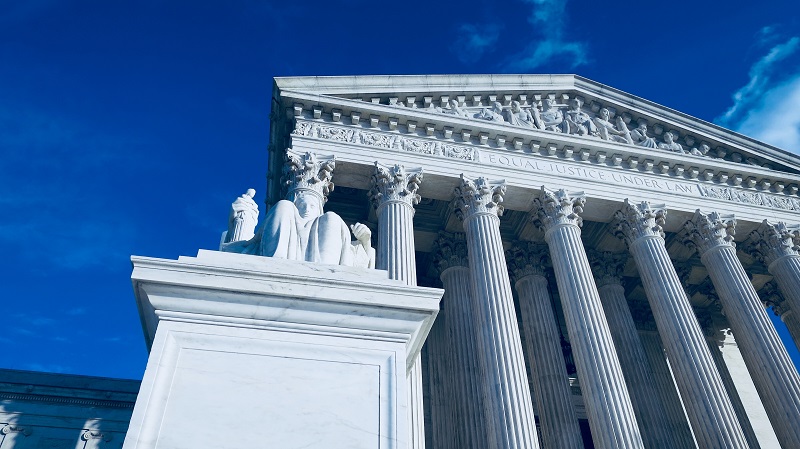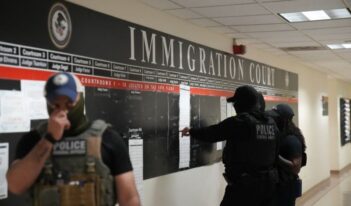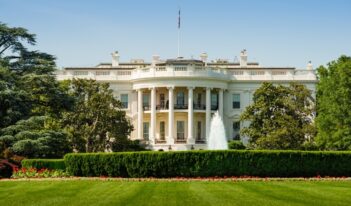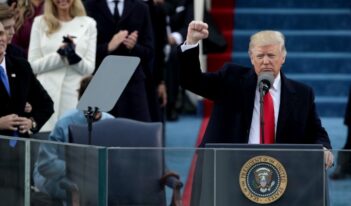
Analysts offer insights about the Court’s most important regulatory decisions of the past term.
During its recently concluded term, the U.S. Supreme Court handed down decisions that touched on a wide range of pressing regulatory and administrative law questions. The topics addressed by the Court included those involving public unions, state gambling laws, e-commerce taxes, and the use of presidential authority to control immigration.
“The Court took up a strikingly large number of important regulatory cases this term,” noted Cary Coglianese, director of the Penn Program on Regulation. “This series of essays in The Regulatory Review demonstrates the significant impact these cases will have on the administrative and regulatory world.”
In this series, we present numerous essays by leading legal scholars and practitioners commenting on the Court’s most significant regulatory decisions from this past term. We will be running new essays each day this week, and we look forward to publishing numerous additional essays in the weeks ahead. Readers should be sure to check back at this page as we add more commentaries throughout the month.
With the announcement of Justice Anthony Kennedy’s retirement and President Donald Trump’s nomination of an additional justice, the Supreme Court finds itself again in the spotlight. The Regulatory Review is pleased to present this series of essays as a way of informing readers of the Court’s most recent impact on an array of public policies effectuated through the nation’s regulatory system.
Continuing to Trade One Form of Discrimination for Another
July 9, 2018 | Leah Litman, University of California, Irvine School of Law
On the second-to-last day of the term, the U.S. Supreme Court issued its decision in Trump v. Hawaii and decided to use the case as an opportunity to denounce Korematsu as wrongly decided. The moment the Court denounced Korematsu was a bittersweet one, at best, and it was also a telling example of how the Court regularly reinforces discrimination while purporting to reject it.
Federalism Comes Out As the Winner in Murphy v. NCAA
July 10, 2018 | Ilya Somin, Antonin Scalia Law School, George Mason
The recent decision from the U.S. Supreme Court in Murphy v. National Collegiate Athletic Association is a major victory for federalism. Since the decision in Murphy applies to other similar federal laws, this precedent will have implications for a wide range of issues beyond regulation of sports gambling.
The Quagmire Created by National Association of Manufacturers v. DOD
July 11, 2018 | Joel Beauvais, Latham & Watkins LLP
The ruling in National Association of Manufacturers v. Department of Defense, together with the Trump Administration’s strategy of using multiple rulemakings to rescind and replace the Clean Water Rule, has resulted in an increasingly complex tangle of litigation in district courts across the country. The upshot is continuing uncertainty on the scope of regulation under the Clean Water Act, an issue that is critical for many sectors of the economy and for environmental protection.
Lucia Turns Out to Be Much Ado About Nothing
July 12, 2018 | David Zaring, The Wharton School
The impact of the Lucia v. SEC decision will not be dramatic, though it is yet another example where a separation of powers argument “worked,” even if the remedies provided to plaintiffs who successfully raise separation of powers claims are modest.
A New Standard for Bias in the Administration of Justice
July 16, 2018 | Tobias B. Wolff, University of Pennsylvania Law School
Although the principle of religious neutrality in government is well established, the standard that the Court applied to the record before the Colorado commission was remarkable. Masterpiece Cakeshop v. Colorado Civil Rights Commission may wind up shaping the way that we measure impermissible bias in the business of government.
The End of Challenges to Partisan Gerrymandering
July 17, 2018 | Michael S. Kang, Northwestern Pritzker School of Law
Opponents of gerrymandering might have believed the growing severity of gerrymandering under modern hyperpartisanship would ultimately motivate the justices to act. It is easy now to foresee that the Court will sooner close the door altogether on gerrymandering claims than provide any new constitutional restraints on partisan gerrymandering in the future.
Right-to-Work Reaches Public Unions
July 18, 2018 | Sean Burke, University of Pennsylvania
In Janus, the Court singled out agency fees for special treatment under the First Amendment and few people, least of all the litigants, seem to doubt the decision will do unions real harm.
Jennings v. Rodriguez in an Era of Mass Incarceration of Non-Citizens
July 23, 2018 | Sarah Paoletti, University of Pennsylvania Law School
At present, the federal government detains almost 360,000 immigrants a year. The Supreme Court’s decision in Jennings finds detainees’ choice between fighting and facing indefinite detention or giving up all claims for relief to be acceptable under current immigration law.
The Implications of the Supreme Court’s Wayfair Decision
July 24, 2018 | Michael Knoll, University of Pennsylvania Law School
South Dakota v. Wayfair is not so much the end of the story as it is the opening of a new chapter in the long-running saga of state efforts to collect sales taxes on goods purchased from out-of-state sellers.
Is There Any Role Left for Federal Regulation of Sports Wagering?
July 25, 2018 | Eric G. Fikry, Blank Rome LLP
The expansion of sports wagering after Murphy v. NCAA will undoubtedly impact not only casinos, racetracks, and sports pool operators, but also a wide variety of technology and financial industry companies that will play roles in the development of online and mobile sports wagering applications.
Inconsistent Views on Waiving Rights in Employment
July 26, 2018 | Charlotte Garden, Seattle University School of Law
A different Court might have constructed a unified understanding of the circumstances under which employees can waive their rights—an understanding that might be generally pro- or anti-waiver. But in Epic Systems Corp. v. Lewis this Court has done neither.
Shunting Aside Chevron Deference
August 7, 2018 | Jonathan H. Adler, Case Western Reserve University School of Law
Long a fixture of administrative law, Chevron v. Natural Resources Defense Council is suddenly under siege. Chevron deference was raised in defense of agency interpretations of statutory language in five cases this past term, and in all five cases a majority of the Court rejected the agency’s plea.
Elections Have Consequences, on Future Elections
August 10, 2018 | Neil Makhija, Berger Montague
In Husted, the Supreme Court allowed Ohio to turn voting into a use-it-or-lose-it privilege, like coupons, credit card points, or airline miles with expiration dates, instead of a fundamental right that is protected by the Constitution and multiple hard-fought-for federal laws.



